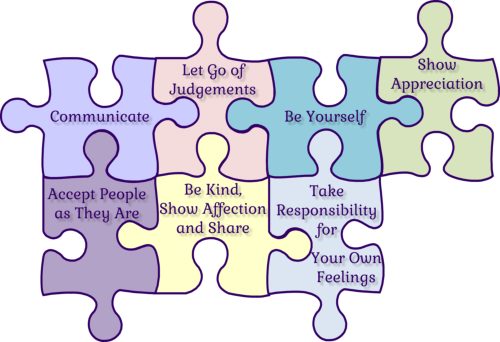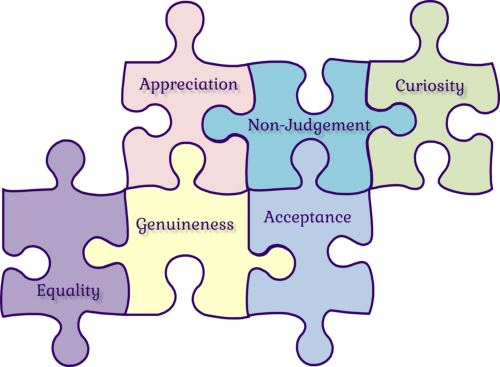

THE PATH TO HAPPY RELATIONSHIPS
Attitudes for Successful Relationships
I find if I use the statements under each attitude as a mantra, they help me live the attitude.Acceptance
I will not try to change you. I accept you just as you are. Your perspective is different from mine. We all have a right to our own perspectives and beliefs. It is not my job to change anyone but me.Non-judgment
There isn’t right and wrong, just different. I respect other people’s perspectives.Curiosity
I want to learn how you see the world, what you believe and feel. Understanding others increases closeness, and provides me an opportunity to learn alternative beliefs and views.Equality
All of us are imperfect human beings. We are all equally worthy. I am deserving of respect and have a right to experience and express my feelings.Genuineness
I share what I think, feel and experience. I embrace my uniqueness. I let go of needing others to see things my way. I try to be my best self. I am honest with myself, and with others (although I won’t share things that will hurt the other person, unless it is important information for them to have).Appreciation
I focus on what you add to my life. I am grateful for your presence. I remind myself of all the things I like about you, and our relationship. I will be generous and caring.Actions for Successful
Relationships
Communicate
Listen to other people with a curious mind that wants to understand the way they see the world. Let go of judging whether their views are right or wrong, accept that they are different, and perfectly alright. Ask people about their perspectives and their beliefs. Pay attention to their answers. Get to know how they see the world. Try to understand their views, however different from yours. You don’t have to adopt their views, just accept their right to have them. Try to let go of the filter that interprets everything said through, “How does this affect my relationship with this person?” That filter makes you defensive rather than open to truly understanding the other person’s thoughts and feelings. Active listening consists of saying back to others what you just heard them say while trying to identify with whatever they are feeling. This is particularly useful when emotions are high. Don’t debate, argue, or judge. Try not to think of your response. Simply listen and repeat what you just heard, which will show them you understand. For example: “I heard you say you felt … when … happened.” When people feel they are being heard and understood, they often discover a deeper understanding of the situation and themselves. Sharing in their exploration is true communications and increases the closeness of your relationship. Ask for what you want. While it won’t guarantee you will get what you want, asking vastly improves your chances of getting it. You might need to explain why you want what you’re asking for by sharing your beliefs and feelings. This can open a dialogue about both persons’ beliefs. At a minimum, the resulting honest conversation can lead to greater understanding and rapport. It’s also an opportunity to clarify for yourself what you really want, and of course, it increases the likelihood you will get whatever it is you are after. On the other hand, don’t state a command or a request as a question about what the other person wants. When I want to go out to dinner, I no longer ask my husband, “Would you like to go out to dinner?” because he would usually rather stay home and have me cook. If I say, “I don’t want to cook tonight, would you like to go to X restaurant or get Chinese food?” we communicate much more clearly. If you value other people’s happiness, make an effort to do things that will increase it. Find out what you can do that makes them feel loved, valued, appreciated and accepted, and do those things you are willing to do. I think a better version of The Golden Rule would be “do unto others as they would have you do unto them.” This is because the way you want to be treated is not necessarily the way others would like to be treated. Gary Chapman has identified Five Love Languages – the actions that make us feel loved. Read them at his site, and take the on- line quiz to determine your preferred love language. Understanding each other’s preferences and doing what makes the other person feel loved increases relationship satisfaction. Let go of the outcome. Ask for what you want, without expecting to get it. Realize that others may or may not choose or be able to give you what you want. Accept what you get. Sometimes we think having our way is what we want, when all we really need is to be heard. And sometimes what we get is even better than what we thought we wanted. Set consequences. While you can’t change what other people choose to do, you can tell them how you will respond to their actions. You can apply “Parenting 101” consequences to any of your relationships. For instance, tell someone who says hurtful things to you how those words make you feel, and that if they do it again, you will leave. But think about your ultimatums carefully, and choose them thoughtfully, because if you don’t carry them out, no one will believe you the next time. Creating win/win bargains are best of all. Offer the other person something that makes him or her happy, in exchange for what you would like to receive in return. Situations where everyone wins increase positive feelings in any relationship.Accept other people as they are
An Internet story sent to me included this profound line: “True love is an acceptance of all that is, has been, will be, and will not be.” Throw out the “rules” for how people and relationships should be. Many of us have “rules” our partner or friends don’t even know about. We expect them to behave according to our rules and get hurt or mad when they don’t. It is great to talk about what you each think your “relationship rules” are, and negotiate which ones you both agree to operate under. In Bridget Jones’ Diary, Mark Darcy tells Bridget “I like you very much, just as you are.” It’s a seductive statement because acceptance is one of the greatest gifts we can bestow on another, but it’s one that can be hardest to give those we’re closest to. We want our spouse to “share more” or to stop nagging. We want parents to show their love and acceptance in particular way. We want a sibling to stop drinking. We want a child to stop whining, or to act responsibly. We need for them to be what we want, instead of accepting them as they are. When we put conditions on our friendship and love, when we tell people what they “should” do (or even think it), we cease accepting them as they are. We enter into a struggle to determine who will control the other person’s behavior. That is a contest you will always lose. If you don’t lose it outright because they won’t do what you want them to do, but they give in to what you want, they are likely to become angry or resentful at being forced, and you lose their affection. We can’t change other people. We especially can’t change how they feel. Remember it’s not what we do that causes their feelings; it’s what they tell themselves about what we have done. Many times we feel hurt because we assume we know other people’s feelings from the behaviors we see, but we interpret them incorrectly, based on how we act when we feel a particular way. The only way to be sure of another person’s feelings, thoughts or beliefs is to ask them. I used to believe my father seldom thought about me, that he didn’t care because he never called or wrote. After checking it out, it turns out my father loves me to the best of his abilities and he is proud of me. He just tends to respond to people demanding his attention. Now I choose to believe that he does think of me. When I want to make sure of it, I call or email him. Then not only do I know he has to be thinking of me, my reaching out to him often connects us. Parents may argue it’s their job to change their children. I would argue that beyond loving and accepting their children, the primary role of parents is to help their children examine the beliefs they are forming, and to challenge those that will hinder their ability to negotiate the world and become happy, responsible, productive humans. Since parents control a large part of the environment surrounding their children, they can set consequences that encourage the desired beliefs and behaviors. However, ultimately even children decide their own actions, beliefs and attitudes. If we stop believing we can change other people, we may find there are some into whom we have put a lot of energy and emotion, and in return we get little pleasure or even suffer pain. In such cases, you need to decide if your life is better off with those people in your life exactly as they are. If they add to your life in some way, let go of wanting them to be different. If the answer is no, it may be time to let go of the relationship. In the case of relatives or co-workers who will remain in your life regardless of how you feel about them, let go of the expectation and hope they’ll become different, easier-to-get-along-with people. Remember you can’t change them, so stop struggling to make them something they can’t be. All you can do is limit the contact that upsets you, and remind yourself it is about them, not about you. Remember to focus on the good things about the people you love and the value of your relationships, because thinking about the things we are grateful for makes us happier. When I get frustrated by something my husband does, it helps me to think of the ways in which he finds it difficult to live with me. In other words, I walk around in his shoes for a while. And I think of the letter to Ann Landers from a widow who now misses her husband’s snoring, so I forgive his imperfections as I hope he forgives mine.Let go of judgments
Stop yourself every time the word “should” pops into your head. It implies judgment, and we often use it to turn what we want into commands for others. Let go of any judgments about what anyone else should do or should be. Let go of any judgments that “you’re not good enough” if you don’t meet the expectations of others. As you stop judging others – and yourself – you’ll let go of your fear of how others may judge you. Believe that being yourself – and the kind of person you want to be – is good enough.Be yourself
Honestly share with others how you see the world, what you feel, what you think, what you believe, what you need and want. Tell the truth about who and what you are. Admit what you don’t know. Reveal your innermost self. Stop worrying about how others perceive you. Admit your imperfections. Tell them you are a work in progress. Human beings make mistakes, and mature adults can acknowledge them without feeling they are a threat to their sense of worth. When someone trusts us enough to be open and vulnerable with us by revealing his or her darkest secrets, it’s hard not to care about that person. Therefore, believe that people will like you after you’ve revealed your warts. Be who you are and say what you feel.Those who mind don’t matter.
And those who matter don’t mind.
~ Dr. Seuss
As for our partnerships, Carolyn Hax said in her newspaper advice column, “There is only one thing any of us should ever do to please a mate – and that is to be ourselves. It should be as good a version of ourselves as we can realistically sustain on a daily basis for a lifetime, but ourselves nonetheless. When that’s not good enough and the love gets doled out on merit, I guarantee you an unhappy couple – maybe not today, but inevitably, either when the sparks cool off, or the babies come, or the money gets tight, or the going gets dull, or you both come home too many times too tired to pretend to be someone else for the other’s benefit. There is such a thing as a relationship that’s just too much work.”Take responsibility for your own feelings
Other people do not cause our feelings. We often think other people’s actions were taken with the intention of causing the feelings we experience in response. Yet our feelings are really the result of what we tell ourselves about what we experienced. The same event might cause vastly different feelings in two different people, based on the beliefs they have about the world and themselves, which are themselves the result of how earlier experiences were interpreted. We can change the stories we tell ourselves, even about past experiences, and change how we feel today. It’s a mistaken belief to think that another person can make us happy. A partner does not make our dreams come true. A partner can only encourage you to make your own dreams come true. When something’s upsetting you, or causing you to feel distant from your partner, it’s your responsibility to share your feelings. Not sharing your feelings with your partner shuts him or her out of your life. If we expect other people to provide our sense of worth, we are asking too much of them. The only way to feel valuable is to value yourself. Self-esteem doesn’t come from the outside. It comes from what you believe about yourself. It comes from believing in yourself.Show appreciation for the nice things people do and the ways they add to your life.
Think about what you’re grateful for in your relationship. Tell people honestly what you like and admire about them. Actor David Niven said, “Relationships are built on mutual appreciation, and there is no better way to show that appreciation than to tell someone how much you care.” In her newspaper column, Jan Denise quoted a reader’s therapist saying, “Two people are compatible if each thinks that he or she is a better human being because of the other person.” Look for the ways that this is true for you. And let the other person know about it. I like to use card-giving occasions as opportunities to express my gratitude to the people in my life, and to tell them the ways they’ve made me a better and happier person.Be kind, show affection, and share
George Eliot said, “What do we live for, if it is not to make life less difficult for each other?” Erica Jong defined good marriages as those “where both people are just trying to get through their days by helping each other, being good to each other.” If you value other people’s happiness, make an effort to do things that will increase it. Find out what you can do that makes them feel loved, valued, appreciated and accepted, and do those things you are willing to do. I think a better version of The Golden Rule would be “do unto others as they would have you do unto them.” This is because the way you want to be treated is not necessarily the way others would like to be treated. For instance, I love having my feet rubbed, but my husband hates to have anyone touch his feet. For him, a scalp massage is an expression of love. Now that I know this, sometimes I feel myself resenting that he doesn’t give me a scalp massage as often as I give him one. Then I remind myself I haven’t asked for one, so I am responsible for my own resentment. Don’t expect to do everything together. Let your partner do the things he or she enjoys, on his or her own or with others. Find things you enjoy doing together. Try things he or she likes – you might discover a new pleasure. A friend of mine discovered a passion for bass fishing when she tried it with her beloved. Share responsibilities and duties with your partner. Newspaper columnist Jan Denise put it this way – “Two people are compatible if they respect each other enough to accept and learn from each other; as well as like each other enough to enjoy each other’s company while they’re taking out the trash.” Researchers have found that one of the surest ways to predict the demise of a marriage is if the partners treat each other with criticism and contempt. So if you notice those feelings in yourself, check your beliefs. Use the Path to Happy Relationships Exercise to investigate the thoughts and judgments that are creating those negative feelings.

















Choose to be happier!
You have found the place
to learn what YOU can do
to have a happier,
more fulfilling life!




© Molly L. Stranahan, Psy.D. 2022




Subscribe to our Newsletter































